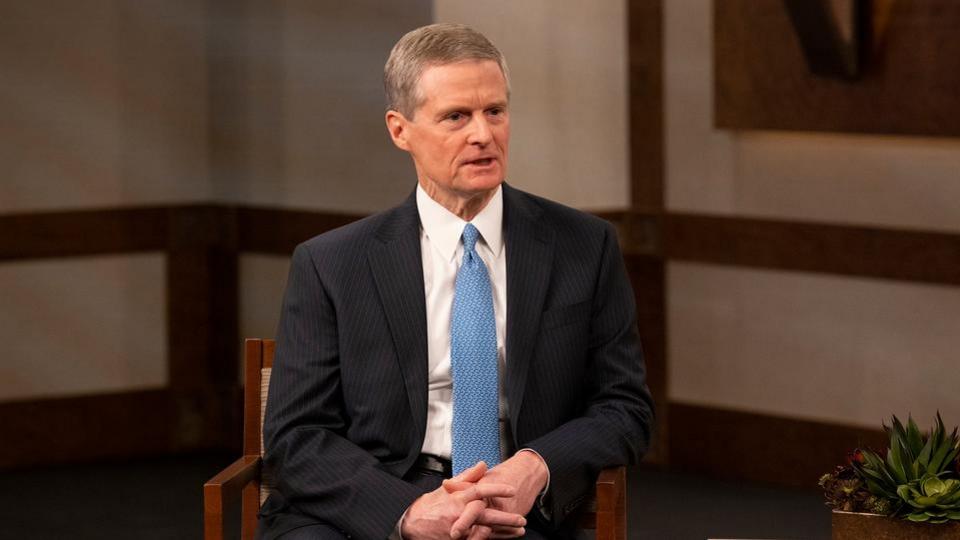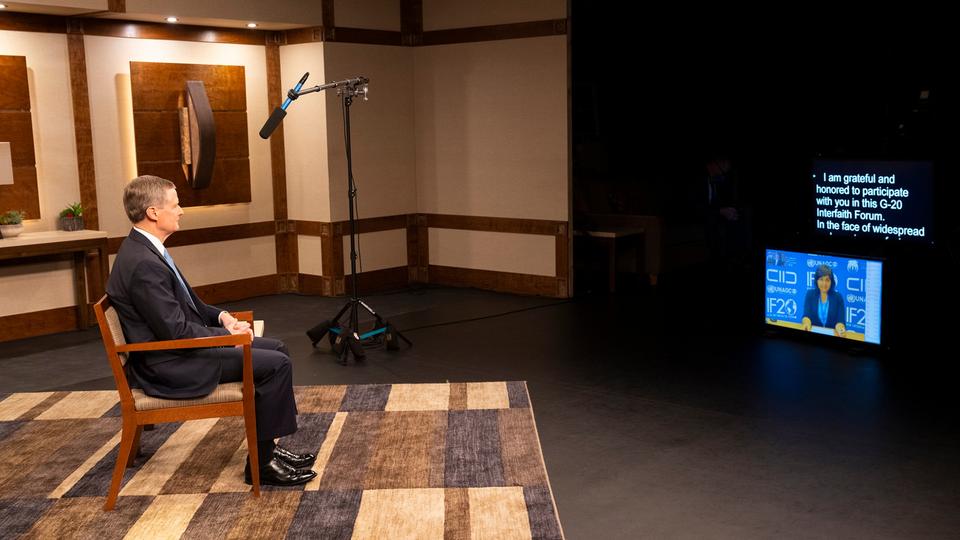Elder David A. Bednar of the Quorum of the Twelve Apostles said Wednesday, October 14, 2020, that the labeling of religion as a non-essential activity by some governments has placed an unfortunate stumbling block along the path to recovery during the COVID-19 pandemic.

Read Elder Bednar’s complete remarks at the 2020 G20 Interfaith Forum
This is a key message for the G20 Interfaith Forum because the organization pursues solutions to global problems through collaboration with a wide variety of religious and policy leaders. Recommendations from this five-day gathering will be presented in November to the G20, chaired this year by the Kingdom of Saudi Arabia. The G20 brings together the heads of the world’s leading economies. It is the premier forum for international economic cooperation.
What, then, should government officials understand about the role of religion — both in society and in the life of each believer? Faith communities help billions of people find meaning and purpose, Elder Bednar said. They transmit “moral and social truths to the next generation.” These, he added, are vital functions.
This is why, Elder Bednar noted, religious freedom is recognized in international law as a “non-derogable” right (see, for example, Article 18 of the Universal Declaration of Human Rights and this charter from the United States Commission on International Religious Freedom). “Non-derogable” means religion is a freedom that is inviolable, even in emergencies.
A proper understanding of and respect for religious groups can yield important benefits for the entire community, Elder Bednar said. This approach can foster trust and tap into the vast resources religious bodies possess, including social capital.
“Many religious leaders already have called on their members to make great sacrifices out of deep love and respect for the safety of others,” said Elder Bednar, whose plenary session also included remarks from representatives from the Catholic, Jewish and Muslim faiths. “Acknowledging and respecting those sacrifices and seeking for greater cooperation and accommodation is the way forward.”
Several examples of fruitful religious help during the pandemic, not mentioned by Elder Bednar, are worth noting. These include Latter-day Saints helping produce 5 million face masks for frontline health care workers in Utah; Latter-day Saint Charities helping fund the World Food Programme’s global distribution of critical supplies during the pandemic; and many more instances of Latter-day Saints bringing pandemic relief to their local communities in Finland, Hong Kong, the Philippines and elsewhere.
Religious groups can also help combat misinformation, Elder Bednar said, by debunking rumors, calming fears and facilitating the sharing of accurate information.

G20_Elder-Bednar_Listening
Elder David A. Bednar listens to panelists speak during a plenary session at the G20 Interfaith Forum on Wednesday, October 14, 2020. The Apostle participated from a studio at the Church Office Building. The digital 2020 forum is hosted by the Kingdom of Saudi Arabia.2020 by Intellectual Reserve, Inc. All rights reserved.“Respecting the dignity of religious people pays important dividends,” he said. “But these powerful opportunities and benefits are possible only if officials acknowledge that for believers and their faith communities religion is essential to their identity and very being!”
“My hope and prayer,” he concluded, “[is] that government officials and faith leaders can collectively respond to COVID-19 in ways that protect both physical and spiritual health.”
Elder Bednar is the third Apostle and fourth Church leader to participate in the G20 Interfaith Forum. Elder D. Todd Christofferson and Sister Sharon Eubank (the latter of Latter-day Saint Charities) spoke at the 2018 event, hosted by Argentina. And Elder Gerrit W. Gong joined Sister Eubank at the 2019 gathering, hosted by Japan.
Sister Eubank will speak Saturday morning, October 17, 2020 — the final day of the interfaith gathering — in a plenary session about the important role of faith communities in the wake of disasters.